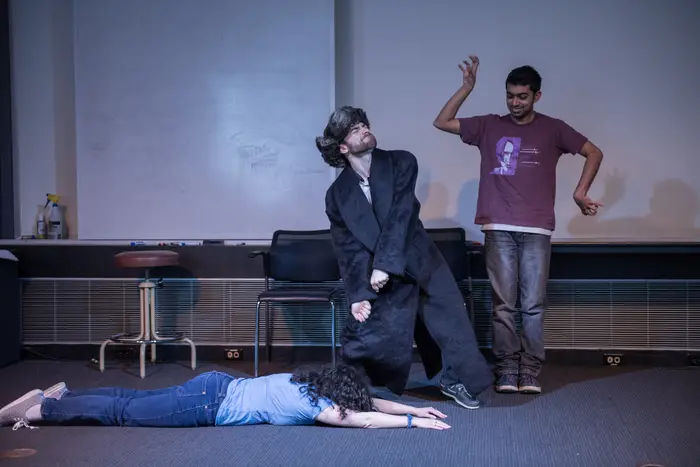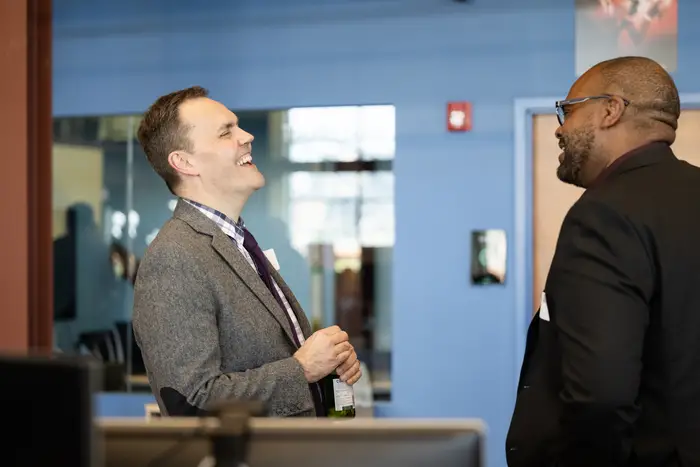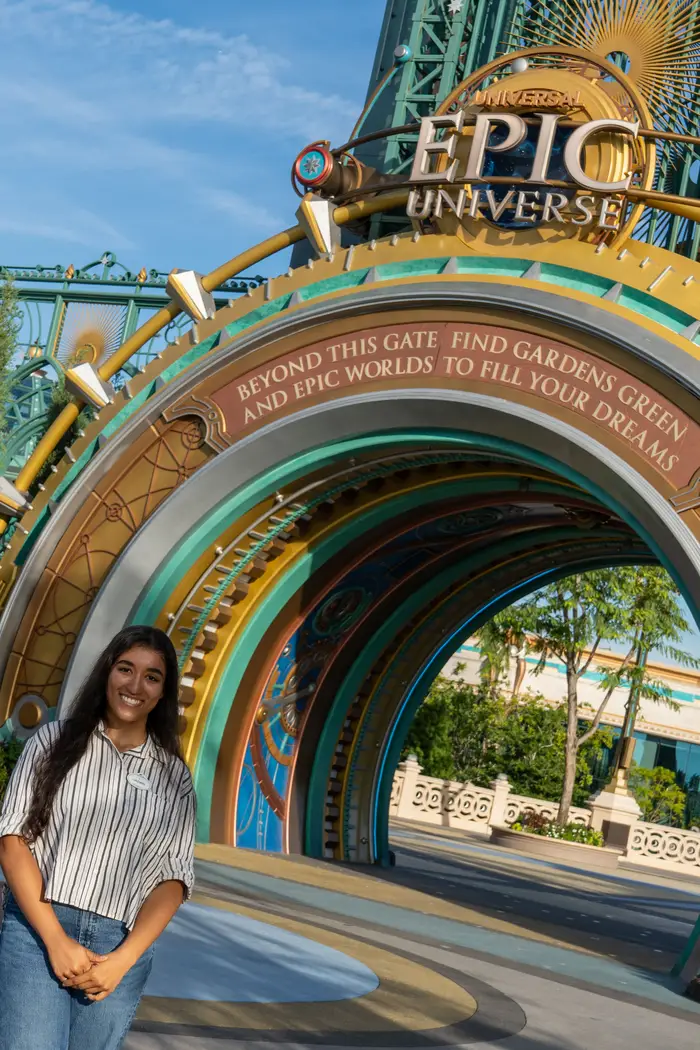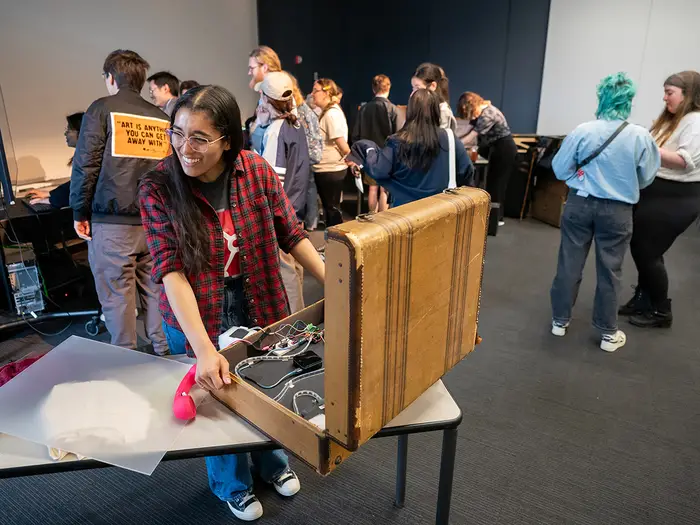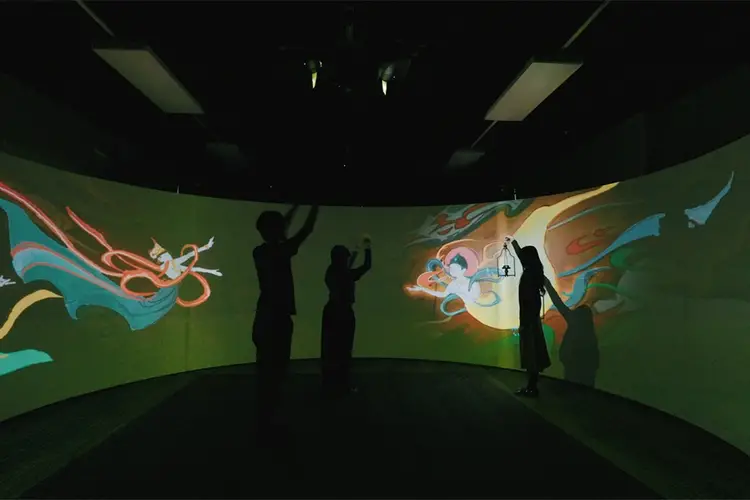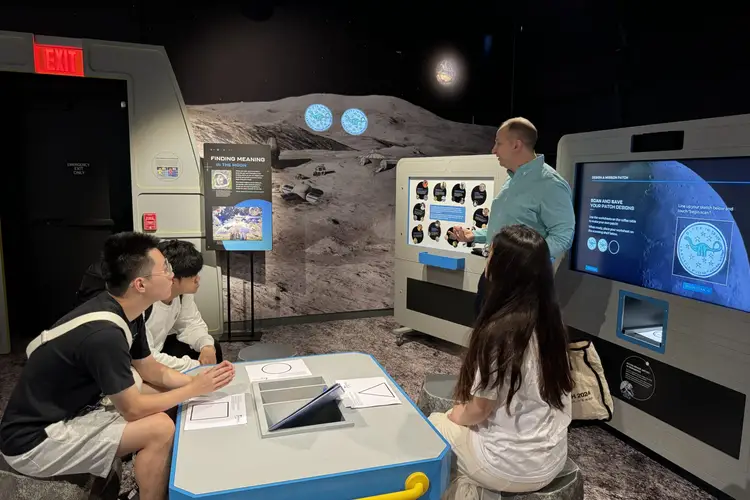


Achievement Unlocked, Future Loading: ETC Turns 25
Media Inquiries
For 25 years, Carnegie Mellon University’s Entertainment Technology Center(opens in new window) (ETC) has been a playground where dreamers, builders and storytellers innovate at the intersection of art and technology. Co-founded by former CMU drama professor Don Marinelli and the late computer science professor Randy Pausch, the ETC began in 1999 as a bold collaboration between Carnegie Mellon’s College of Fine Arts and School of Computer Science — built on the belief that artists and technologists could create extraordinary things together.
With a network of more than 1,000 alumni who are influencing entertainment, education and industries across the globe, this graduate program remains a premier destination for exploring emerging technologies. Through project-based work in a uniquely collaborative environment and mentorship from faculty and industry leaders, students learn by doing.
Building virtual worlds
Among the ETC’s most iconic offerings is Building Virtual Worlds (BVW), a fast-paced course where interdisciplinary teams rapidly prototype interactive experiences. BVW remains a cornerstone of the ETC curriculum, embodying the program’s commitment to collaboration and experimentation while pushing the boundaries of emerging media.
The showcase of the students' virtual worlds in McConomy Auditorium at the end of the year quickly outgrew its original format as the course gained popularity and momentum.
Dave Culyba(opens in new window), associate teaching professor and ETC alumnus who now teaches the course, said the rise of accessible virtual reality technology enabled the BVW show to transform into what is now a multi-floor festival inside the ETC building — an immersive, hands-on event where visitors explore student-created virtual worlds firsthand.
“Designing for an audience is very different from designing for a player. Instead of focusing on showmanship, the festival lets our students focus on the user experience, which better aligns with our educational philosophy,” he said.
Embracing the improv mindset
Brenda Bakker Harger(opens in new window), a graduate of CMU’s School of Drama, teaches Improvisational Acting at the ETC. She calls improv the “secret sauce” of the curriculum. It’s the first class ETC students take together, and it sets the tone for collaboration.
Built on a set of rules that foster safety, collaboration and creativity, her course shows students how to be generous teammates, serve the collective narrative and make their partners look good — principles that create a level playing field and encourage open, fearless communication, she explained.
“Improv is more than a performance tool. It’s a paradigm that helps students to navigate uncertainty and co-create in meaningful, innovative ways,” she said.
Through exercises that help them develop a “yes, and … ” mindset, students learn to accept and build on their teammates’ ideas rather than reject them, making improv an ideal foundation for interdisciplinary teamwork.
“The ETC is a model for improv: Here’s an idea, and there are all of these disparate elements. Our impulse is to keep changing the idea to make it better. Judging ideas should happen, but not too early. If you commit to the idea, and you continue to say yes to the given conditions and build on those ideas, amazing things happen,” she said.
First penguins and other fearlessness
Experimentation and creative risk-taking have been hallmarks of the ETC since its inception. In fact, Pausch believed so strongly in the link between failure and innovation, he introduced the First Penguin Award in the BVW course to celebrate the students who took the biggest creative risks, even when their projects didn’t succeed.
Inspired by the bravest penguin willing to dive first into uncertain waters, the award — a stuffed penguin — is still given each semester to the team that most courageously explored new ideas or technologies, regardless of the outcome.
“The award encourages students to push boundaries and embrace uncertainty, knowing their failure might help others succeed. These core values continue to define the ETC experience today,” Culyba said.
Shaping the future
Jesse Schell(opens in new window), CEO of Pennsylvania’s largest game design studio, joined the ETC faculty in 2002 and played a key role in shaping the BVW course. He also introduced Game Design, an elective that quickly became one of the program’s most popular offerings.
“Being around students who are excited about finding their way into the future is an energy that you just can’t find anywhere else,” he said.
Schell noted one of the most transformative moments in the center’s history was Pausch’s Last Lecture in 2007, which brought global attention to the program and its values. After watching the ETC community grow over two decades, he said he sees Pausch’s legacy reflected in the strength of its alumni network — a network that grows more connected and influential with each passing year.
One of those alumni is Neil Druckmann(opens in new window), now CEO of Naughty Dog and co-creator of the acclaimed video game series “The Last of Us.” The idea for the game traces back to a failed pitch Druckmann made in a class taught by Associate Teaching Professor Ralph Vituccio(opens in new window). The assignment: pitch a game concept to “Night of the Living Dead” director George Romero. Romero ultimately selected a pitch by Druckmann’s classmate, Brad Stokan, who is now an art director at Pipeworks Studios, but that isn’t where the story ends.
“Neil had some bold ideas that didn’t quite come together, but then we watched him carry all that thinking with him to Naughty Dog. When it came time there to do something new, he took what he learned about creating an emotional zombie story, and he found a way to do it,” Schell said.
Released in 2013, “The Last of Us” is an action-adventure video game that set a new standard for emotional storytelling in the gaming industry. Set in a post-apocalyptic America devastated by a deadly fungal outbreak, the game follows Joel, a hardened survivor, and Ellie, a teenage girl who may hold the key to humanity’s survival. Its success spawned a sequel, “The Last of Us Part II,” and a hit HBO television adaptation, further cementing its legacy as one of the most influential video games of its generation.
With ETC graduates in “virtually every entertainment technology company you can think of,” Schell said, he feels a profound sense of responsibility.
“The students at the ETC are going to be the leaders of the future. It’s been that way for 25 years, and it’s going to continue. If we can instill the right values and priorities in them, they’ll carry those forward and use them to make the world a better place. That’s a big part of it for me, making sure these future leaders are focused on the right things,” he said.
Really achieving your childhood dreams
For second-year student Jasmin Ali-Diaz, the ETC has been life-changing. A childhood love of theme parks led her from Orlando to Carnegie Mellon, where she’s now pursuing her dream of designing immersive experiences. She’ll start her second internship with Universal Creative in the spring.
“It’s been one of the best experiences of my life," she said of the internship. "There’s nothing else in the world like going to a theme park. It’s my favorite kind of storytelling. I love the idea of creating immersive worlds you can completely lose yourself in. You become part of the story.”
Ali-Diaz and her team recently created an interactive lobby installation(opens in new window) for the School of Drama’s production of “Titanic: The Musical,” a fully student-driven project that brought her classroom learning into the real world.
“It was so much fun, because we got to take our own idea, design it, build it, troubleshoot it and then install it. I think having a client-based relationship like that can really help prepare you for the workplace,” she said.
ETC alumnus Nagarjuna “Arjun” Varma was hired by Playstation along with most of his student team after working on a project for which Sony Interactive Entertainment was the client.
“They really liked three of our four prototypes. They seemed surprised that we were able to generate a high-quality gameplay experience on those prototypes, and they wanted us to continue,” Varma said.
Benjamin Walker is an ETC student who works for Homewood Children's Village, a local nonprofit that helps children and families in Pittsburgh’s Homewood neighborhood through education, supports and community collaboration. He’s developing a business plan for the nonprofit to one day have a gaming studio where local children can come to learn, design and publish analog and digital games.
“The ETC offers the kind of leadership training I need to learn how to bring a team together and turn an idea into a finished product,” Walker said. “Someone gave me the chance to grow as a student, and now I want to create that same opportunity for others.”
John Balash(opens in new window) taught K-12 students for nearly a decade before pursuing his master’s degree in entertainment technology at CMU. Now, he serves at his alma mater as director of Academic Outreach Extension and Engagement.
As a result of Balash’s passion for play — specifically with LEGO — CMU has partnered with an award winning United Kingdom based social impact company to offer training in the Pittsburgh region so that formal and informal educators can facilitate "Brick Clubs" themselves. By steadily growing this playful learning ecosystem, he has recognized the ETC as a great way to introduce Carnegie Mellon to others.
“We focus on play. When we sit down and interact with youth and their educators, whether it’s in school or in an after-school program, we can take some LEGO and get right to the fun. Once we’ve formed a shared language in play, we can then more meaningfully engage in conversations around emerging entertainment technologies like mixed reality,” he said.
Balash said there’s no better place than Carnegie Mellon and the ETC to experience how effective playful learning can be.
“The way you do this is through first experiencing it,” he said.
The legacy lives on
Schell said the center’s original curriculum continues to resonate because its core principles have stood the test of time.
“What was true 25 years ago remains true today: Learning how to be a meaningful part of a team, where everyone has different disciplines and you need each other's strengths to build something none of you could build alone, is a special skill,” he said.
Today, the ETC continues to thrive as a hub of applied research and experiential learning. Recent projects include designing a virtual reality pet you can feel(opens in new window), using video games to train wildfire responders(opens in new window) and helping the Moonshot Museum inspire future careers in space(opens in new window).
“Twenty five years later, we are still working at the intersection of art and technology, but we have built on these themes to encompass much more,” said the center’s director, Derek Ham(opens in new window). “The ETC community doesn’t just look at how things are today, but how they might be tomorrow.”

